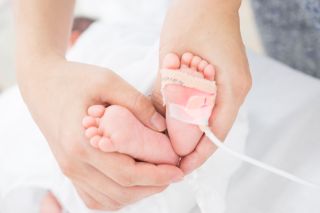Attachment
Preemies Are People, Too
Infant mental health should be paramount in the NICU.
Posted July 18, 2023 Reviewed by Hara Estroff Marano
Key points
- Babies need touch and soothing to develop and thrive.
- Infant mental health deserves a critical place among the many needs of pre-term babies.
- The separation of parents and babies leads to poor outcomes on both sides.
“Your baby’s out. They’re resuscitating him now.” Those were the first words I heard while lying on the operating table, shivering from anesthesia, a glass tube next to me filling with blood. There was my son, a small, bluish thing, surrounded by frantic medical staff responding to the code blue.
That was the start of my son William’s life, named on that early morning in February for “strength.” William was rushed away to the Neonatal Intensive Care Unit for his first six weeks, and I can’t even remember how long it was before we could hold him. Visits were limited to one hour every three, and then, eventually, finally, through layers of tubes, my husband and I could make skin-to-skin contact with our baby.
On one of those early, torturous days, when I had been sitting at the “bedside” of William’s incubator, I was struck by how bright, noisy, and chaotic the NICU felt. Beeping machines, nurses rushing to and fro, fluorescent lighting: It was a lot for my neurotypical sensory system to manage. And here were these fragile creatures, experiencing the assault of sensory overload.
I pulled the social worker aside, explaining how damaging this sensory tsunami was for these underdeveloped nervous systems and my worry for my brand-new tiny preemie. “He hasn’t even reached his due date yet,” she said. “So don’t worry. It’s like he’s not born yet.”
I was stunned. “But he’s right there. He’s taking all this in.”
I began to circulate articles. A former supervisor of mine in an infant mental health program directed me to the work of Harvard psychologist Heidelise Als, an innovator in the design and understanding of the developmental care of premature babies. I desperately distributed what I thought would be welcome insights. I was met with polite but dismissive nods.
Some of the nurses were wonderful. They suggested making audiotapes of us reading children’s stories that they would play for our son at bedtime. We still repeat the timeless rhymes of Sandra Boynton’s But Not the Hippopotamus, our only lifeline to our helpless little infant inside his glass box.
The saddest part was the babies who had no visitors. The attachment traumas unfolding before my eyes were unbearable to witness. Many parents don’t have the luxury of time away from work and other children, and, in the absence of any psychological education, the attachment needs of these babies were not being communicated from hospital to parent. Or met. Babies need skin-to-skin contact, a safe and reliable loving presence, and responsiveness to their emotional and physical needs.
That was 16 years ago. Has there been progress? We know that a NICU stay gravely impacts the mother’s mental health. Articles abound on maternal depression, PTSD, and attachment difficulties. The stress of the NICU experience can impact the parent’s capacity to connect to their baby.
But what about the babies? Kangaroo care involves holding a baby facing the parent with skin-to-skin contact. It is considered the standard of care, yet many barriers exist to its implementation. Volunteer “baby cuddler” programs have sprung up in hospitals across Canada and the U.S. Still, resources are often insufficient to fund enough volunteers to hold the babies who need them. In the meantime, these babies are subjected to painful separation from their caregivers and intrusive, distressing procedures, leading to higher rates of neurocognitive and psychosocial difficulties later in their development (Givrad et al., 2021).

As far as optimizing mental health outcomes, a baby’s relationship with their intimate caregivers is vital to their social and emotional development. Als created the evidence-based Newborn Individualized Developmental Care and Assessment Program (NIDCAP) back in 1984, and it is considered the “gold standard” of care. Part of Als’s contribution is understanding that long-term neurodevelopmental problems are prevented through a reflective stance that helps parents recognize, interpret, and respond to their baby’s communication. Holding the baby’s emotional world in mind lays the groundwork for a secure, trusting relationship that buffers against adverse mental health outcomes (Browne, 2020).
Unfortunately, a few obstacles complicate the utilization of the NIDCAP model. The primary obstacles are that the training is extensive, the model’s implementation requires coordination of the entire neonatal team, and institutional support is needed for its success (Klein et al., 2021).
I often wonder how much my son’s regulatory difficulties stem from this early stay in intensive care. He has never developed a regular sleep/wake cycle. He came home from the hospital with a feeding tube in his nose and with no ability to choose when and how much he ate; he has difficulty stopping what goes in his mouth today. Our early separation still makes it painful to part 16 years later.
The importance of mental health has taken hold in popular culture, giving voice to and bringing awareness to vulnerable and previously overlooked parts of society. I hope that, in the same way, we can begin to provide what is long overdue: a voice to the most fragile among us, our babies in the NICU.
References
Browne, Joy V. (2020). Infant mental health in intensive care: Laying a foundation for social, emotional and mental health outcomes through regulation, relationships and reflection. Journal of Neonatal Nursing, Vol. 27, (1), 33-39. https://doi.org/10.1016/j.jnn.2020.11.011
Givrad, S., Hartzell, G., Scala, M. (2021). Promoting infant mental health in the neonatal intensive care unit (NICU): A review of nurturing factors and interventions for NICU infant-parent relationships, Early Human Development, Volume 154,105281.https://doi.org/10.1016/j.earlhumdev.2020.105281.
Klein V, Zores-Koenig C, Dillenseger L, Langlet C, Escande B, Astruc D, Le Ray I, Kuhn P and Strasbourg NIDCAP Study group (2021) Changes of Infant- and Family-Centered Care Practices Administered to Extremely Preterm Infants During Implementation of the NIDCAP Program. Front. Pediatr. 9:718813. doi: 10.3389/fped.2021.718813


